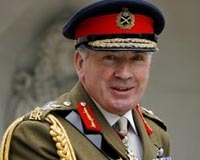| . |  |
. |
London (UPI) Jul 15, 2009 A recent public opinion poll in Britain suggest support for the Afghan mission is holding up at around 50 percent, but there are growing doubts about how long it will be sustained unless there is clear and tangible progress in defeating the Taliban insurgency. Massive public deficits arising from the financial and economic crisis and the British government's reluctant admission of sharp spending cuts in coming years limit its ability to bolster public support for the Afghanistan mission by large-scale financial commitments to increase troop numbers and equipment. British casualties in Afghanistan now exceed those in Iraq, an invasion that a large majority in Britain believe was wrong in principle and ill-conceived in its execution. The death of 15 British soldiers in Afghanistan in only 10 days and emotional public ceremonies as their bodies are returned to the United Kingdom for burial are putting Gordon Brown's government under more pressure over both their aims and their commitment to the troops fighting the Afghan mission. The issue has recently dominated parliamentary "Questions to the Prime Minister" -- a rowdy and widely reported weekly debate in which the leader of the opposition seeks to score political points. Michael Clarke, head of the Royal United Services Institute, a London-based military think tank, says public concern is mounting, and he has urged politicians to be more honest about Britain's initial reasons for joining the 2001 invasion. "What they won't really say is that it's about the credibility of the NATO alliance, and our military relationship with the United States," Clarke said. Some analysts believe the cohesion of the NATO alliance and strong relations with the U.S. military -- tainted in the British public's eyes by the Iraq mission -- may not be good enough reasons for the British public to continue supporting the dangerous Afghanistan mission. Political debate in the United Kingdom centers on the level of troop numbers and, in particular, on whether those currently fighting in Afghanistan are adequately equipped, above all with properly armored vehicles and helicopters. While there is cross-party backing in principle for British participation in the NATO operation, Prime Minister Brown's government -- seen by many as a lame-duck administration almost certain to lose a general election in 2010 -- is under attack from the opposition and, more crucially, from present and former military leaders for allegedly failing to provide troops with enough helicopters. Under fire in Parliament, Brown has argued that the number of British helicopters deployed in Afghanistan has increased by 60 percent over the past two years and their capability by 84 percent. The opposition points out that in spite of that increase there are now fewer helicopters per soldier deployed than there were three years ago. While Brown insisted that a shortage of helicopters was not costing lives in Afghanistan, his case was not helped by a report in the London Times that British army chief Gen. Sir Richard Dannatt was forced to use an American army helicopter to visit British troops on a tour of Afghanistan. Dannatt confirmed he had to use an American helicopter because no British one was available. He called for more urgency in boosting the supply of British military equipment. Gen. Charles Guthrie, the head of Britain's military between 1997 and 2001, said he believes British soldiers have died as a direct result of a shortage of helicopters for troops in Afghanistan. British troops are suffering heavy casualties from roadside bombs, and a lack of helicopters means soldiers must make more journeys across Helmand province by road. Argument over remaining in Afghanistan may not be confined to Britain. In France, which has some 2,700 troops deployed, and in Germany, which has some 3,600 forces focusing on reconstruction and police training in the relatively peaceful north, the governments say stabilizing Afghanistan and eradicating radical Islamists are essential for the security of Europe. Public opinion in both countries favors withdrawal. In Germany, where a general election is due Sept. 27, the two centrist parties forming Angela Merkel's coalition government argue for NATO's Afghanistan mission, though they have their internal dissenters. And in the other parties that could take an estimated 30 percent of the vote, there is widespread opposition to the Afghanistan mission. Share This Article With Planet Earth
Related Links News From Across The Stans
 British army chief calls for troop rise in Afghanistan
British army chief calls for troop rise in AfghanistanLondon (AFP) July 15, 2009 The head of the British Army Wednesday called for more "boots on the ground" in Afghanistan, as Prime Minister Gordon Brown faced fresh accusations that troops were poorly equipped. Speaking on his last visit to Afghanistan before he retires later this month, General Richard Dannatt said it did not matter where the extra troops came from, but they were vital for Afghan society to thrive. ... read more |
|
| The content herein, unless otherwise known to be public domain, are Copyright 1995-2009 - SpaceDaily. AFP and UPI Wire Stories are copyright Agence France-Presse and United Press International. ESA Portal Reports are copyright European Space Agency. All NASA sourced material is public domain. Additional copyrights may apply in whole or part to other bona fide parties. Advertising does not imply endorsement,agreement or approval of any opinions, statements or information provided by SpaceDaily on any Web page published or hosted by SpaceDaily. Privacy Statement |